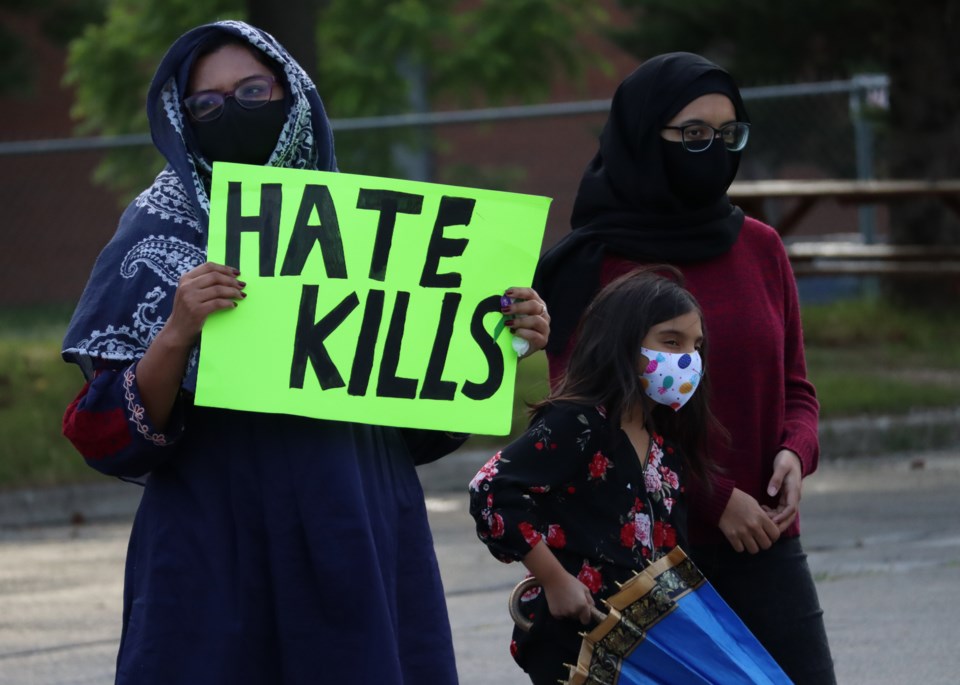This week’s arrest of a Cambridge man for what police are calling a racially-motivated hate crime against two Muslim women is not surprising to Fauzia Mazhar.
Reacting to Wednesday’s news that a 40-year-old was charged with uttering threats and assault with a weapon after a mother and daughter in Hamilton were verbally assaulted with racial slurs and death threats, the executive director of the Coalition of Muslim Women of KW says the news is more a reminder of how widespread these incidents are and how more action needs to be taken by all levels of government to prevent it.
Although extreme incidents are still rare, Mazhar says it would be hard to find a single Muslim in Waterloo region who hasn’t experienced some form of Islamophobia.
It’s the reason the coalition decided to hold a series of town hall meetings to discuss the prevalence of hate in the region, the first of which, held Tuesday evening, focused on Waterloo regional police efforts to track and respond to hate crimes.
During that meeting, Waterloo region’s chief of police Bryan Larkin assured members of the community that police are doing everything in their power to combat hate crime in the community with a dedicated intelligence unit tracking incidents, watching for trends on social media and going after offenders who've become emboldened in recent years by political rhetoric.
Mazhar first recalled hearing about local incidents in 2015. One involved a founding member of the coalition who reported a driver that purposely came very close to hitting her, “stopping at the last second” while she was crossing the street at a stop sign.
“She was really shaken with that,” Mazhar said of the incident that draws parallels to the June 6 murder of the Afzaal family in London, Ont.
Local incidents haven't been nearly as severe, but clear incidents of Islamophobia have been on the rise, she says, some escalating to threats and racial slurs.
The trend prompted the coalition to launch an online reporting tool for xenophobic incidents in April.
Mazhar said reportinghate.ca has since logged over 30 incidents, nine of which the coalition is engaged with by offering support to victims navigating the judicial system and offering counselling.
Mazhar hopes to have the first semi-annual report on the tool's effectiveness in advance of their next town hall in September.
Meantime, Minister of Diversity and Inclusion and Youth Bardish Chagger is leading a National Summit on Islamophobia on July 22.
Local organizations, including the coalition of Muslim women, are looking forward to it, not as a way to further the conversation, but to develop “concrete actions and a timeline,” Mazhar says.
“So it's not about more conversation, it's not about awareness, it's not about brainstorming,” Mazhar says.
Community consultation has already happened across Canada. Now is the time for implementing changes to the criminal code and making clear provisions for hate crime.
“It's called National Action summit for a reason, right? So I think Canadians within these communities are looking for action.”
Mazhar says the key to the summit being considered a success is developing a clear understanding of what constitutes a hate crime and hate speech and what the consequences are for committing such a crime.
“That clarification is important, not only for deterrence, but also for the victimized community to feel relatively safe,” she says.
Right now, she adds, it's difficult to even bring hate incidents to trial and they're rarely tried as hate crimes because they never meet the threshold according to the Crown.
The recent slaying of four members of a Muslum family in London marks the third fatal incident of Islamophobia in Canada since 2017, Mazhar says.
“If we were paying attention to this problem long ago, then maybe those lives might have been saved.”
The Muslim community is also looking for improved supports for victims of hate, and that can only come once the Ministry of the Attorney General provides proper classification, she says.
Getting to the root of the hatred is an action Mazhar and others also want taken following this month’s summit.
That involves making clear distinction of what the consequences will be, working with the offenders in restorative justice programs and creating diversion programs in the community to put an end to incidents of hate.
"These things don't happen in a vacuum," she says.
“But the thing is, we have to have words. You have to understand that this is a crime. And if I did it, that can happen. Right? That's the first thing.”



